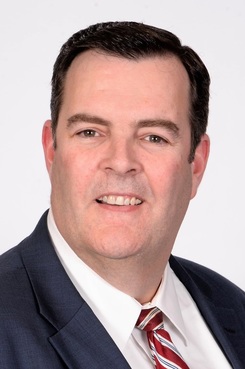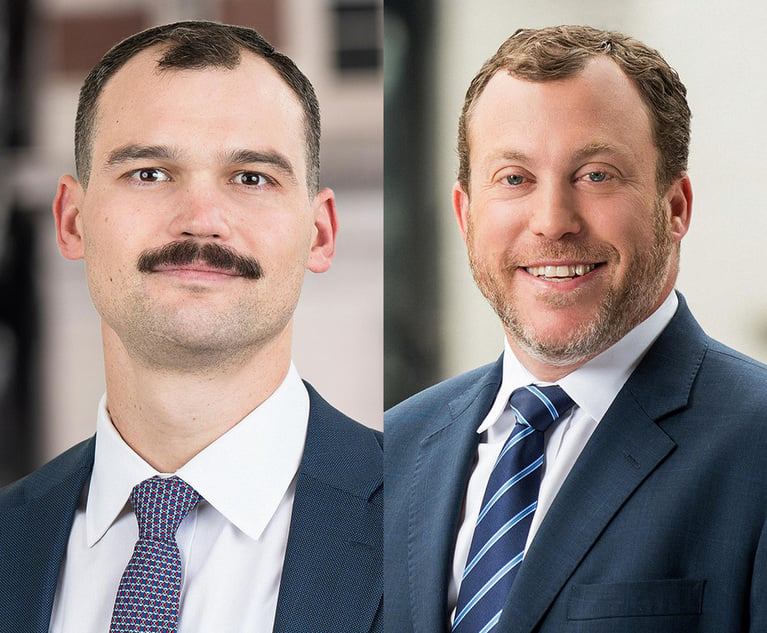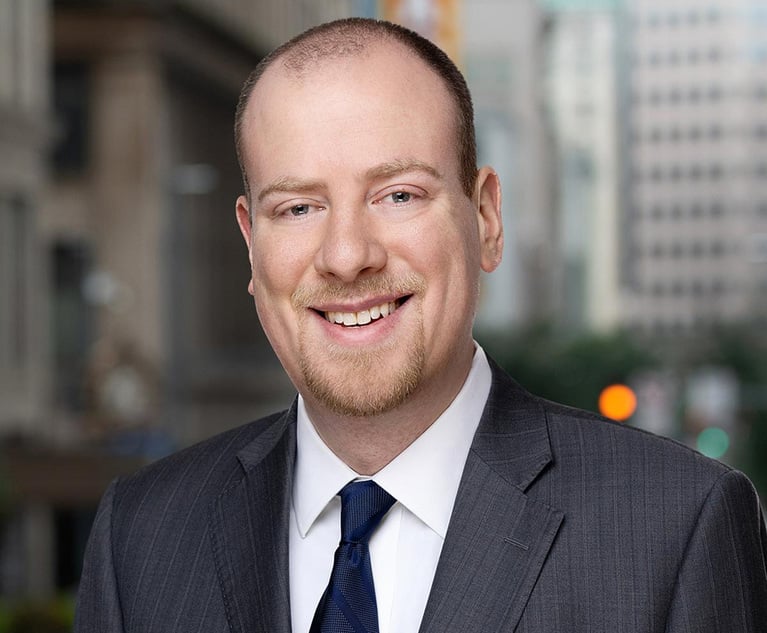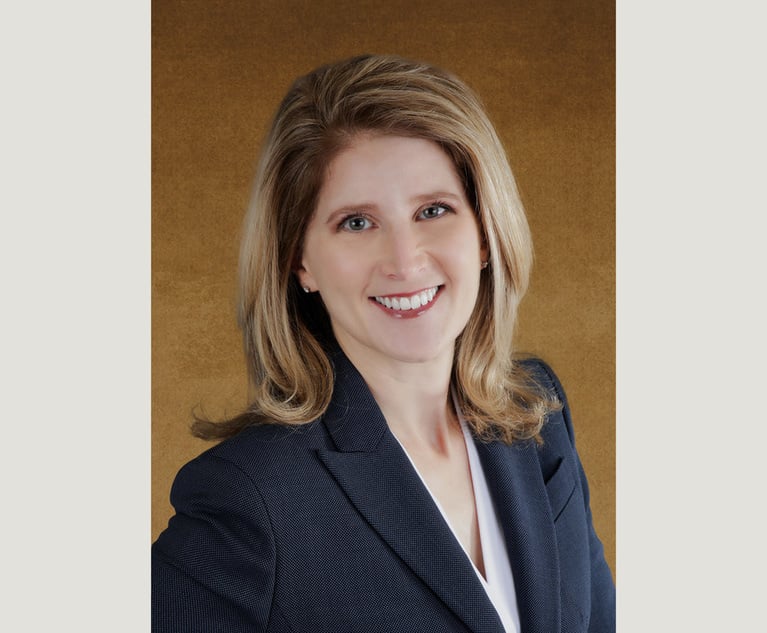Looking at Child Sexual Abuse Through a Two-Year Window
On Aug. 14, the Pennsylvania Attorney General's office released a grand jury report (report) on Catholic clergy sexual abuse after a two-year investigation that revealed that more than 300 priests sexually abused more than 1,000 children over seven decades in six of the state's eight Roman Catholic dioceses.
November 10, 2018 at 01:07 PM
7 minute read
 Christopher Munley, Munley Law
Christopher Munley, Munley Law
On Aug. 14, the Pennsylvania Attorney General's office released a grand jury report (report) on Catholic clergy sexual abuse after a two-year investigation that revealed that more than 300 priests sexually abused more than 1,000 children over seven decades in six of the state's eight Roman Catholic dioceses.
The report, which included Allentown, Erie, Greensburg, Harrisburg, Pittsburgh and Scranton (Pennsylvania's two other dioceses, Philadelphia and Altoona-Johnstown had been the subjects of earlier grand jury reports that found similarly damaging information about clergy and bishops in those dioceses), painted a blistering picture of church officials routinely covering up crimes until the perpetrators were too old to prosecute or litigate.
This report has now reignited a debate about whether to eliminate the statute of limitations for future civil and criminal cases involving child sexual abuse as well as how to address the problem for older victims of past crimes. The issue for these sexual abuse victims is how do they seek justice?
Among other policy recommendations in the report, jurors specifically recommended that the state eliminate the criminal statute of limitations for child sexual abuse and give otherwise time-barred victims a “two-year window” to file civil lawsuits. The grand jury said that “no piece of legislation can predict the point at which a victim of child sexual abuse will find the strength to come forward.”
The grand jurors called for the suspension of the statute of limitations for civil suits to allow victims to seek justice because: “We saw victims; they are marked for life, and many of them wind up addicted, or impaired, or dead. Our proposal would open a limited window, offering them a chance, finally, to be heard in court.”
At least nine states, including Delaware, California, and Minnesota have enacted similar “limited windows” over the last 15 years. Pennsylvania law currently allows criminal prosecutions for child sexual abuse until the victim turns 50. Victims can bring civil lawsuits until they turn 30.
But last year, the Pennsylvania Senate unanimously passed Senate Bill 261 (SB 261) that would eliminate the statute of limitations for criminal prosecution of child sex crimes and allow victims to sue in civil court until the age of 50.
The Pennsylvania House of Representatives amended SB 261 to allow a “two-year window” for victims to file a lawsuit. The amendment would, among other things, suspend the civil statute of limitations for two years for child sex-abuse offenses so that people who were sexually abused decades ago as children would have the opportunity to file lawsuits. This “two-year window” would begin when the law takes effect, enabling any victim of child sex abuse to sue their abuser, no matter how long ago the crime happened.
The author of this amendment, Rep. Mark Rozzi was himself a victim of sexual abuse by a Catholic priest when he was 13, more than 30 years ago. Now Rozzi is leading the fight to give victims of past sexual abuse the right to seek justice. “All victims ever wanted was an opportunity for justice, to be able to walk into that court of law and expose their perpetrators. And maybe we can protect future kids from being abused,” Rozzi said after the final vote in the House. The House voted 173-21 to approve SB 261 with the two-year window on September 25, 2018, and then referred it back to the Senate on the same day for approval.
The Senate has not taken action on the amended SB 261 and it is unclear if the Senate will support the “two-year window.” Some legislators however have acknowledged that the political climate has changed since the Report was released in August.
Legislators have historically avoided taking hot-button votes before an election, making a quick resolution on statute of limitations reform less likely. The two-year legislative session ends at the end of November, and any bill that does not pass before then must be reintroduced in January 2019. As of Oct. 19, there was one regular legislative day, Nov. 14, left in the Senate for 2018.
Lobbyists for the Catholic Church and the insurance industry have vigorously opposed such legislation, arguing that it will open the door to a wave of lawsuits in older cases that could bankrupt parishes and “force today's parishioners to pay for the sins of the past.”
Some argue that any retroactive change in the statute of limitations is unconstitutional and some think the measure is being pushed by trial lawyers motivated by making money from future suits. However, Pennsylvania Attorney General Josh Shapiro has said several times that he believes that a “two-year window” is constitutional.
An alternative to compensating victims through the courts is an approach that the Catholic Church supports—setting up a compensation fund for victims. The church as well as insurance companies are supporting this idea, but Gov. Tom Wolf said that he is against a proposal to compensate victims of child sexual abuse by priests through a church-established fund, saying that lawmakers instead should amend state law to let victims sue over decades-old events. He said that changes to the state's statute of limitations and other proposals in the recent grand jury report “would deliver what victims deserve,” but a fund outside the court system would not. Wolf's Republican opponent in the upcoming election is also against setting up a fund and allowing victims access to the courts.
Another route to change the statute of limitations law in Pennsylvania is through the courts. The statute of limitations typically limits the amount of time a victim has to file a civil case against the person or organization that caused them harm. However, the statute has been extended in cases where there has been “fraudulent concealment of evidence.” A lawsuit filed against the Diocese of Pittsburgh after the Report was released aims to extend or eliminate the statute of limitations in civil cases against the Catholic Church stemming from sexual abuse allegations against clergy members and religious administrators. The lawsuit involves a man who, as a young child, was allegedly abused by a priest named in the Report. The suit further alleges that because these accusations were not made public within the statute of limitations, the victim did not have the opportunity to seek justice.
The systematic coverups described in the grand jury report allowed a pattern of abuse to continue without recourse and led many victims to believe they were alone in their suffering, perpetuating the cycle of abuse and silence. As these horrible findings come to light, it is undeniable that all survivors of childhood sexual abuse have a right to be heard.
Survivors deserve justice and abusers, and enablers, should be held accountable, no matter how much time has passed. The physical and psychological effects of abuse do not have an expiration date. Furthermore, bringing justice in these cases will not only serve the survivors who have had the courage to come forward, it will also send a powerful message to abusers and any individual or organization who would protect them: The time of silencing victims is over.
Christopher Munley, a partner at Munley Law, focuses his practice on personal injury law.
This content has been archived. It is available through our partners, LexisNexis® and Bloomberg Law.
To view this content, please continue to their sites.
Not a Lexis Subscriber?
Subscribe Now
Not a Bloomberg Law Subscriber?
Subscribe Now
NOT FOR REPRINT
© 2025 ALM Global, LLC, All Rights Reserved. Request academic re-use from www.copyright.com. All other uses, submit a request to [email protected]. For more information visit Asset & Logo Licensing.
You Might Like
View All
Pa. Supreme Court to Decide Enforceability of 'Browsewrap' Arbitration Agreements
8 minute read
From a Mediator’s Perspective: Common Mis-steps That Parties Make at Mediation
6 minute readTrending Stories
Who Got The Work
J. Brugh Lower of Gibbons has entered an appearance for industrial equipment supplier Devco Corporation in a pending trademark infringement lawsuit. The suit, accusing the defendant of selling knock-off Graco products, was filed Dec. 18 in New Jersey District Court by Rivkin Radler on behalf of Graco Inc. and Graco Minnesota. The case, assigned to U.S. District Judge Zahid N. Quraishi, is 3:24-cv-11294, Graco Inc. et al v. Devco Corporation.
Who Got The Work
Rebecca Maller-Stein and Kent A. Yalowitz of Arnold & Porter Kaye Scholer have entered their appearances for Hanaco Venture Capital and its executives, Lior Prosor and David Frankel, in a pending securities lawsuit. The action, filed on Dec. 24 in New York Southern District Court by Zell, Aron & Co. on behalf of Goldeneye Advisors, accuses the defendants of negligently and fraudulently managing the plaintiff's $1 million investment. The case, assigned to U.S. District Judge Vernon S. Broderick, is 1:24-cv-09918, Goldeneye Advisors, LLC v. Hanaco Venture Capital, Ltd. et al.
Who Got The Work
Attorneys from A&O Shearman has stepped in as defense counsel for Toronto-Dominion Bank and other defendants in a pending securities class action. The suit, filed Dec. 11 in New York Southern District Court by Bleichmar Fonti & Auld, accuses the defendants of concealing the bank's 'pervasive' deficiencies in regards to its compliance with the Bank Secrecy Act and the quality of its anti-money laundering controls. The case, assigned to U.S. District Judge Arun Subramanian, is 1:24-cv-09445, Gonzalez v. The Toronto-Dominion Bank et al.
Who Got The Work
Crown Castle International, a Pennsylvania company providing shared communications infrastructure, has turned to Luke D. Wolf of Gordon Rees Scully Mansukhani to fend off a pending breach-of-contract lawsuit. The court action, filed Nov. 25 in Michigan Eastern District Court by Hooper Hathaway PC on behalf of The Town Residences LLC, accuses Crown Castle of failing to transfer approximately $30,000 in utility payments from T-Mobile in breach of a roof-top lease and assignment agreement. The case, assigned to U.S. District Judge Susan K. Declercq, is 2:24-cv-13131, The Town Residences LLC v. T-Mobile US, Inc. et al.
Who Got The Work
Wilfred P. Coronato and Daniel M. Schwartz of McCarter & English have stepped in as defense counsel to Electrolux Home Products Inc. in a pending product liability lawsuit. The court action, filed Nov. 26 in New York Eastern District Court by Poulos Lopiccolo PC and Nagel Rice LLP on behalf of David Stern, alleges that the defendant's refrigerators’ drawers and shelving repeatedly break and fall apart within months after purchase. The case, assigned to U.S. District Judge Joan M. Azrack, is 2:24-cv-08204, Stern v. Electrolux Home Products, Inc.
Featured Firms
Law Offices of Gary Martin Hays & Associates, P.C.
(470) 294-1674
Law Offices of Mark E. Salomone
(857) 444-6468
Smith & Hassler
(713) 739-1250







